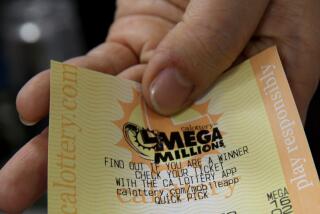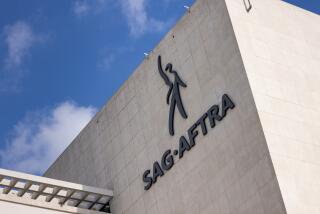Senate OKs Bill Aimed at Boosting Lottery Bids
SACRAMENTO — The state Senate gave overwhelming approval Thursday to legislation aimed at encouraging more competition among bidders for potentially lucrative state lottery contracts by making certain income tax disclosure requirements optional.
The action represented the first time that a bill amending the state lottery initiative has cleared either house of the Legislature. It went to the Assembly, where a similar bill is awaiting a committee hearing, on a 33-1 vote.
The initiative, passed by voters last November, allows the Legislature under limited circumstances to make changes in the law.
The chief feature of the 16-page bill by Sen. Ralph C. Dills (D-Gardena) is a provision designed to enhance competitive bidding by lottery equipment and ticket suppliers.
Concern About Wording
Some industry critics of the initiative have expressed concern that it was written so as to preclude virtually any lottery businesses--except Scientific Games Inc.--from bidding on the potentially lucrative contracts.
Scientific Games, a Georgia-based ticket supplier, spent at least $2.1 million to finance the pro-lottery campaign. Its parent organization, Bally Manufacturing Corp., operates an Atlantic City casino and its officials must make detailed financial disclosures to qualify for a New Jersey gaming license.
Similar Disclosures
The California lottery initiative demanded similar income tax disclosures by officers and principal stockholders of ticket suppliers and their parent companies, a requirement that Scientific Games was expected to easily meet.
However, other potential bidders objected to baring their financial details before making a bid. Under the Dills legislation, the Lottery Commission could decide if disclosure of income tax data was necessary after the bids were submitted.
The initiative required that the lottery start selling tickets on March 21, a deadline that is certain to be ignored. For one thing, the five lottery commissioners were not selected until late last month after what Gov. George Deukmejian described as exhaustive background investigations.
Dills conceded that his bill would do nothing to hasten the start-up, which may not occur until late this year. But Dills defended Republican Deukmejian against Democratic charges that he was unnecessarily “foot-dragging” on making the commission appointments.
Dills said a deliberate and careful approach to establishing the lottery was necessary so that California lottery players “don’t get ripped off.”
The only negative vote was cast by Sen. Jim Ellis (R-San Diego), who argued that liquor stores should not be allowed to sell lottery tickets. “There are some areas where an influx . . . of lottery outlets would be detrimental,” he said.
Opposed Measure
Dills said decisions such as where tickets will be sold would be made by the Lottery Commission and not by the Legislature, adding that he opposed the lottery but “the people want it. So let’s make it work.”
Other provisions of his bill would make it a misdemeanor to sell a lottery ticket to anyone under age 18, allow Deukmejian and the Legislature to determine the commission’s operating budget and reduce from $600 to $20 the maximum prize that a ticket retailer could pay.
The reduction in pay-outs by retailers was sought on behalf of convenience-store operators who feared that maintaining large sums of cash on hand would encourage robberies.
More to Read
Get the L.A. Times Politics newsletter
Deeply reported insights into legislation, politics and policy from Sacramento, Washington and beyond. In your inbox three times per week.
You may occasionally receive promotional content from the Los Angeles Times.










